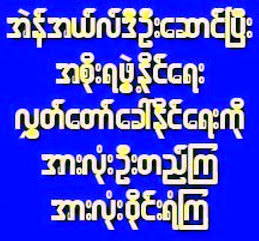
5 killed in Rangoon shootout
Mizzima NewsMarch 4, 2008
Five people were shot dead yesterday near opposition leader Aung San Suu Kyi's residence in Rangoon.
One man and four women were shot in their heads in a rare gunfight, as the possession of firearms is strictly controlled in the military ruled country.
Mizzima has learnt that the male victim is Charlie, a businessman and the father-in-law of the owner of Fuji coffee house, located near the site of the shooting. Charlie is a native of Mogok.
"They are not friendly with the neighbors", said a resident of University Avenue, speaking of Charlie and his family.
The accident happened in a house near to Nobel Peace Laureate Aung San Suu Kyi's home and the state-run guest house 'Sanelaekanthar' where the opposition leader has met the junta's liaison officer.
The last shooting of a civilian by another civilian in the nation's commercial hub and former capital was more than two decades ago when a man was shot by a gun using a silencer in a gambling related incident.
Ordinary citizens are not allowed to own weapons in Burma, which has been under military rule since 1962.
Mizzima NewsMarch 4, 2008
Five people were shot dead yesterday near opposition leader Aung San Suu Kyi's residence in Rangoon.
One man and four women were shot in their heads in a rare gunfight, as the possession of firearms is strictly controlled in the military ruled country.
Mizzima has learnt that the male victim is Charlie, a businessman and the father-in-law of the owner of Fuji coffee house, located near the site of the shooting. Charlie is a native of Mogok.
"They are not friendly with the neighbors", said a resident of University Avenue, speaking of Charlie and his family.
The accident happened in a house near to Nobel Peace Laureate Aung San Suu Kyi's home and the state-run guest house 'Sanelaekanthar' where the opposition leader has met the junta's liaison officer.
The last shooting of a civilian by another civilian in the nation's commercial hub and former capital was more than two decades ago when a man was shot by a gun using a silencer in a gambling related incident.
Ordinary citizens are not allowed to own weapons in Burma, which has been under military rule since 1962.






